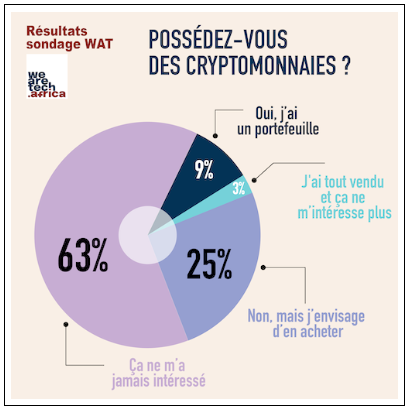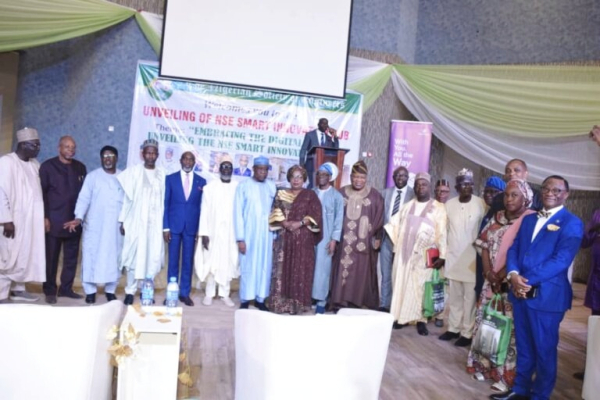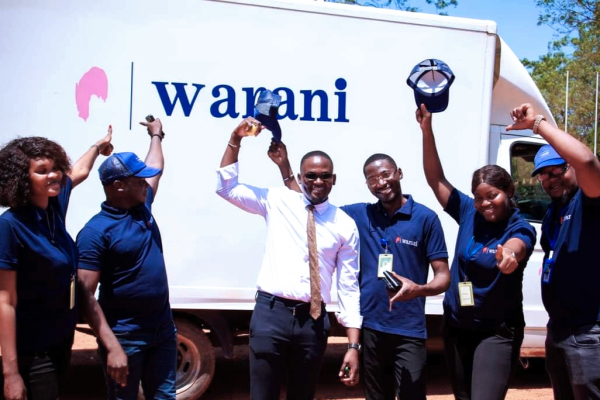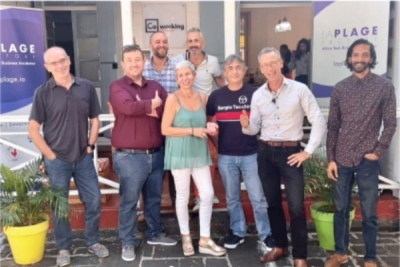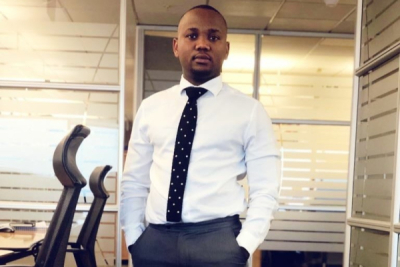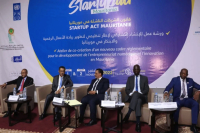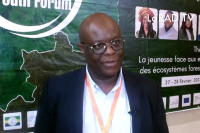Apart from science and technology, engineering is one of the most important sectors of the Nigerian economy. It is therefore important for professionals in the sector to digitize their activities to capitalize on the digital opportunities.
The Nigerian Society of Engineers (NSE), the umbrella organization of engineering professionals in Nigeria, inaugurated its Innovation Center in Abuja on Wednesday, September 13.
According to its executives, the new center will serve as a sanctuary for engineers and professionals to collaborate and innovate, and offer training and resources to facilitate the adoption of digital technologies by businesses and organizations.
According to Tasiu Sa'ad Gidari-Wudil, President of the Nigerian Society of Engineers, the aim of the center is to empower Nigerian engineers, allowing them to deliver on what is expected from them. "The innovation hub is where Engineers will come with ideas, research and develop” those ideas before commercializing the end products to the public and stakeholders, he added.
The 600 million naira ($780,000) center will integrate technologies, services, tools and data analysis. It will also offer smart business solutions to members, facilitating the learning curve by providing available resources, with an e-library accessible both online and on company premises.
The implementation of the center is in line with one of the administration's priorities to ensure ease of doing business and greater transparency within the profession.
Once completed, the center will also serve as a space to explore the immense potential of artificial intelligence and the Internet of Things. The idea is to find solutions to complex challenges, revolutionizing industries and the way we interact with the world around us.
Samira Njoya
Despite being democratized, the Internet is still not easily accessible in some African countries. Nevertheless, some tech entrepreneurs are doing their utmost best to offer connected populations tailor-made solutions and services.
Warani Shop is an e-commerce application developed by a Central African startup. It enables users to make online purchases and have them delivered to the address indicated during the ordering process. The Bangui-based start-up was founded in 2023 by Vianney Kanda.
"After numerous reflections on some of the problems faced by Central Africans, notably in accessing quality products, or getting products delivered, I decided to create Warani, which is a bridge between the customer and the seller. [...] Warani's main objective is to allow access to services and products for Central Africans," says Vianney Kanda.
Through the Warani mobile app –for Android and iOS devices, a user can create an account to access the services offered by the solution. From cosmetics and beauty products to kitchenware, hardware, loincloths and clothing, Warani Shop is a comprehensive online boutique. It integrates several payment methods, such as Visa card, Orange Money, or even cash on delivery.
Given that internet penetration is low in the Central African Republic –10.58% in 2021, according to the International Telecommunications Union– the startup has dedicated a number for orders by phone. Since its launch on Saturday, September 9, 2023, the Android version of its mobile app has already been downloaded more than a hundred times, according to Play Store data.
Adoni Conrad Quenum
With its unique entrepreneurial setting and dedication to fostering innovation and entrepreneurship, La Plage Factory is positioned as the ideal guide for Mauritian tech companies targeting African and European markets.
Located in the heart of Port-Louis, Mauritius, La Plage Factory is a remarkable startup incubator and accelerator on the African tech scene. Founded by Michel Cordani, a self-taught entrepreneur with over 25 years of international business experience, it is dedicated to propelling impactful African tech startups.
It offers a full range of services designed to support startups at every stage of their development. These services include mentoring, business model development, and dedicated support. Each startup is assigned an experienced mentor who acts as a committed partner, providing weekly coaching. The business model development program is based on a proven method of aligning products and markets, preparing startups to attract investors.
The incubator offers a combination of seminars, training, group sessions, and specific reviews to suit the needs of each startup. To further enrich the startup journey, La Plage Factory provides coworking space, administrative services, access to funding, and networking opportunities.
The incubator draws on its network to identify strategic partners, potential customers, and sources of financing. In addition, it offers entrepreneurs access to an ever-expanding network of professionals, as well as a platform for administrative services and skills enhancement.
Accredited by the Mauritius Research & Innovation Council (MRIC) in 2018, the incubator-accelerator led the Mauritian delegation at Viva Technology 2022. Also in 2022, it received the African Start-up Ecosystem of the Year award and the Incubator and Coworking of the Year award.
A member of the AfriLabs network, it is supported by Fuzé Digital Africa, Catalytic Africa, and French Tech Mauritius, among other partners.
Melchior Koba
The trained finance professional is experienced in risk management. With Mapha Logistics, he facilitates e-commerce operations for small and medium-sized businesses.
Loyiso Vatsha (photo) is the co-founder and CEO of Mapha Logistics, a logistics company specializing in on-demand delivery. He graduated from the University of Pretoria, South Africa, with a bachelor's in actuarial science and financial mathematics, in 2014.
In 2017, he co-founded Mapha Logistics to support local businesses that were struggling to access quality inventory, competitive prices, and efficient customer bases. His startup offers last-mile on-demand delivery and procurement solutions for small businesses in urban and peri-urban areas.
The aim is to empower businesses by providing a platform that enables them to create an online store, source supplies, deliver goods to local customers, accept online payments, and track inventory and delivery drivers. The company also serves as a marketplace for the public to easily order products from thousands of restaurants, convenience stores, cosmetics stores, and more.
In 2016, Loyiso Vatsha founded Mapha Foodshare, a food-sharing platform that allows users to post, sell, buy, and share with people in and around their neighborhoods.
A philanthropist, in 2022, he also founded the Vatsha Foundation to improve the lives of children living in poverty in South Africa, by promoting quality public education and children's health and improving the economic stability of families living in poverty.
Since 2021, he has been the Managing Director of Azania Ventures, a South African venture capital firm. From 2016 to 2019, he was a financial risk manager for South African financial services holding Rand Merchant Bank.
With Mapha Logistics, he has earned several awards. For instance, in 2021, he won the SAB Foundation Social Innovation Award, which “finds, supports and scales social innovations.” In 2022, he was also one of the beneficiaries of Google's Black Founders Fund program.
Melchior Koba
For several years now, Cassava Technologies, through its subsidiaries Liquid Intelligent and Liquid Dataport, has been stepping up investments in connectivity infrastructures in Africa.
Earlier today, September 13, Liquid Intelligent Technologies, one of the subsidiaries of pan-African group Cassava Technologies, announced the launch of two fiber optic routes: one linking Kenya and Ethiopia, the other Zambia and Malawi. The aim is to improve broadband connectivity in these countries and stimulate technological innovation.
“All initiatives undertaken by businesses under Cassava Technologies work towards realizing our vision of a digitally connected future that leaves no African behind. The completion of these fiber links is yet another milestone achieved by Liquid, as it continues to lay the foundations of economic growth through increased access to high-speed connectivity,” says Hardy Pemhiwa, CEO of Cassava Technologies.
The about 1,000-km route linking Nairobi (Kenya) to Mega (Ethiopia) is being built in partnership with the Kenya Electricity Transmission Company (KETRACO) and Ethiopia Electric Power (EEP). It offers a capacity of four terabytes per second and will enable Ethiopian companies to access Kenyan data centers and the cloud. "Kenyan and Ethiopian businesses are rapidly adopting digital technologies, and this new link will enable trade and investment between these two great nations in our region," says Adil El Youssefi, CEO of Liquid Intelligent Technologies Rest of Africa.
The second route (711 kilometers long) provides a direct and reliable connection to content caches and data centers in South Africa.
Earlier this year, the pan-African company signed a partnership with Zambia to accelerate the country's digital transformation and provide reliable, and affordable connectivity to the population. Last May, it also announced the construction of roads linking Mombasa in Kenya to Muanda in the DRC, via Rwanda and Uganda.
Adoni Conrad Quenum
The decree-law no. 2023-17 of March 11, 2023, governing cybersecurity in Tunisia and setting out the missions and operating structures of the National Cybersecurity Agency (ANCS), came into force on Monday, September 11.
Placed under the authority of the Ministry of Communication Technologies, the new agency will be responsible, among other things, for supervising the security of the information and communication systems of public and private companies in the national cyberspace.
Mauritania, like several African countries, is stepping up efforts to develop entrepreneurship and support startups and SMEs. For more efficiency, the country needs a framework that will govern all of its actions.
On Saturday, September 9, the Mauritanian Parliament approved the Startup Act, the draft startup law in Mauritania, the Ministry of Digital Transformation announced this in a press release published by local media.
"The purpose of this law is to promote the creation and promotion of startups in Mauritania [by focusing on] creativity, innovation, the use of new technologies, the achievement of high added value as well as national and international competitiveness," the release informs.
The draft law was initiated by private and public stakeholders of the Mauritanian tech industry in March 2022. On September 7, 2023, it was presented to Ministers at the Ministerial Council held that day. The law is part of the Islamic Republic of Mauritania's overall strategy for the development of the digital economy and innovation. Its main objective is to define an incentive-based legal and institutional framework for the creation and development of young technology companies in Mauritania.
According to the country's authorities, the law includes provisions such as conditions for granting the startup label and support as well as conditions for access to tax, customs, and miscellaneous incentives to facilitate the installation and development of startups.
Once promulgated by the President of the Republic and implemented, the Startup Act should facilitate startups’ access to financing and investment, both locally and internationally. The aim is to label 300 startups over the next five years, support a dozen or so entrepreneurial support institutions –therefore helping create 3,000 direct jobs– and contribute to the digital economy at a rate of around 2.5 million MRU ($66,000) in sales per labeled startup.
Samira Njoya
After years of successful operations in Egypt, the super app decided to enter several Middle Eastern markets this year. To this end, it has signed several partnerships to enhance its services.
Yalla is a super app developed by an Egyptian startup. It enables users to send and receive money, pay merchants, and order food from partner restaurants. The Cairo-based startup behind it was founded in 2021 by Waleed Sadek.
Through its mobile app –available for Android and iOS devices only, users can create accounts to access its various services. In addition to the main services mentioned above, it also integrates on-demand transport, an online store, payment for data and airtime, insurance subscriptions, etc. Yalla also offers virtual cards to facilitate online commercial transactions.
"Yalla Card (physical & virtual in Yalla Super App) is the only financial account you will ever need to manage your money. It will help you send, receive, pay, withdraw, save, invest, and track your money," the startup explains on its website. It is also possible to make ATM withdrawals, lock and unlock the card in just one click, and set spending limits, right from the mobile app.
The super-app claims over 1.6 million users and more than 6 billion Egyptian pounds (approx. $194 million) in transactions since its launch. In addition to Egypt, it is also present in the United Arab Emirates, Pakistan, and Saudi Arabia. Talking about the expansion into Saudi Arabia, which was announced last week, Waleed Sadek explains that his startup aims "to attract around one million Saudi users in the first year of operation, by offering the best possible services that meet” customers’ needs.
Adoni Conrad Quenum
In Gabon, Akewa is positioned as a beacon of innovation. Its commitment to fostering entrepreneurship and providing technological solutions to community challenges sets it apart as a leader in the technology industry.
Akewa Accelerator claims to be the first incubator and accelerator launched in Gabon for entrepreneurs and young people with innovative projects in the ICT, mobile technology, social and solidarity entrepreneurship, and green economy sectors.
Founded in 2013 by Fabrice Ntchango –a serial entrepreneur who is the CEO of the accelerator, Akewa offers a wide range of services involving the provision of workspace, technology incubation, and mentoring. It provides support to project leaders or promoters who want to launch or develop their businesses. Its Services are focused on key sectors such as cultural industries, renewable energies, agri-food, ICT, and the environment.
Akewa’s pre-incubation and incubation programs support project leaders in developing and validating their business ideas, designing and testing a prototype, and drawing up a bankable business plan.
Its acceleration program offers early-stage startups access to mentoring, investors, and other forms of support to help them become stable and self-sufficient. The program can last from two to six months. It also provides accelerated startups with logistical and technical resources, as well as co-working space.
In 2022, it implemented notable initiatives including “Green Accelerator”, an entrepreneurial support program that took place entirely online. It also implemented the "Young Girl Digital Mother" (YGIDIMO), a program that provided digital coaching to 10 young mothers, helping them to develop income-generating activities. The award ceremony for the first winner of the YGIDIMO program took place in March 2023.
Akewa Accelerator has also created technological solutions, such as the Africa Climate App, a hybrid application that prevents climate risks and disasters, as well as the CINES Business & Digital School web platform, which offers certified training to its customers.
It also offers auditing, consulting, and strategy services. It helps companies raise funds and offers training courses as well as organizes events such as competitions, networking sessions, and conferences.
Thanks to its various initiatives and programs, Akewa won the award of the Best African Technology Company of the Year 2022, organized by the Alpha Blue Foundation and the African Digital Conference & Awards (ADCA). "This award confirms that we offer reliable, sustainable technological solutions that serve communities," its founder said, in January 2023, when the award was announced.
Melchior Koba
He has a PhD in computer science and has worked for several international firms. After venturing into the world of entrepreneurship, he launched an agritech startup that offers solutions to help stakeholders make the right decisions.
Dieu Donné Okalas Ossami (photo) is a trained computer scientist and tech entrepreneur. Born in Congo, he studied in France where he graduated (in 2002) with a Master of Advanced Studies in software engineering from the University of Franche-Comté. He also holds a PhD in computer science (in 2006) from the Marketing Academy in London, England.
In 2015, he founded E-Tumba, an agritech startup that combines mobile technologies, big data, connected objects, and mechanistic agronomic models to make productive and sustainable agriculture a reality in Africa. Based in Montpellier, France, it designs, develops, and supplies smart advisory and decision-support tools for agriculture and the environment for producers and technologically under-equipped areas in Africa.
His startup has designed and developed two main technological solutions. The first, Fieldsim, is a SaaS (Software as a Service) platform that helps producers make their agricultural sectors more sustainable. The solution, focused on agriculture and the environment, combines three service levels, namely industry management, advice, and decision support.
The second solution, BioFuncTool, is aimed at all players in the agricultural value chain. It is a digital solution comprising a mobile field application and a SaaS web application enabling non-specialists to measure, assess, and preserve the biodiversity of agricultural soils.
Since 2013, Dieu Donné Okalas Ossami has been an IT Security Analyst for VeriFone Systems France in Europe, the Middle East, and Africa. His professional career began in 2005 at I.U.T Nancy-Charlemagne, where he was an assistant professor.
A postdoctoral researcher at Compiègne University of Technology between 2006 and 2007, he joined electronic payment solutions provider Hypercom as head of payment platform security and compliance. He worked there from 2007 to 2011.
Melchior Koba
More...
Before Interswitch, Flutterwave, and Nala integrated this payment method developed by the American firm Alphabet.
Interswitch, a Nigerian financial technology startup, has integrated Google Pay into its Interswitch Payment Gateway (IPG) platform, according to a press release issued on Monday, September 11.
“Merchants can now store payment details within Google Wallet. This integration facilitates a smoother checkout process on the Interswitch platform, heightening the user experience. Additionally, the collaboration enables the acceptance of international cards on the Interswitch Payment Gateway, positioning businesses to seamlessly cater to a broader international clientele,” the release reads.
Interswitch, founded in 2002 by Mitchell Elegbe, became a unicorn in 2019 following the acquisition of 20% of its shares by US giant Visa. It has made a name for itself in the African fintech world, and during the COVID-19 pandemic, it proved to be the alternative of choice for commercial transactions in Nigeria and across the continent.
"By integrating Google Pay into our Payment Gateway, we are empowering businesses to harness the potential of a global customer base while ensuring secure and reliable payments," said Muyiwa Asagba, Managing Director of Digital Commerce and Merchant Acquisition at Interswitch.
Thanks to this integration, "users can simply add their debit and credit cards to the Google Wallet app and feel confident that their financial information is safe and secure when they’re making a purchase or catching a train," says Jenny Cheng, vice president and general manager of Google Wallet.
Adoni Conrad Quenum
Africa’s most valued startup (with $3 billion in estimated value) will now be able to offer major currencies like the US dollar, the Euro, and pound sterling to users in Nigeria.
On Monday, September 11, Nigerian unicorn Flutterwave announced the launch of a new solution called "Swap". Designed in partnership with Wema Bank and Kadavra BDC, and backed by the Central Bank of Nigeria (CBN), the Swap solution is billed as a secure and reliable digital platform that will give Nigerians immediate access to foreign currency at competitive exchange rates.
“At Flutterwave, our dedication to innovation is matched only by our commitment to simplifying financial processes for endless possibilities. Swap represents a significant leap forward in how Nigerians will engage with foreign exchange,” said Olugbenga Agboola (photo, left), co-founder and CEO of the unicorn.
Indeed, Nigeria has been facing several foreign exchange problems in recent years. One of these is a $10 billion foreign exchange backlog, which the CBN aims to resolve within the next two weeks. This backlog includes dollar claims from manufacturers, importers, business and personal travel allowances, as well as medical bills incurred abroad.
According to CBN Acting Governor Folashodun Shonubi, Swap will solve two critical problems plaguing Nigeria's foreign exchange market: the lack of synergy between financial institutions and a heavy reliance on cash transactions.
In the short term, Flutterwave will introduce a convenient card-issuing system for Swap users. The company plans to distribute over 10 million of these cards to Nigerians by October, enabling them to quickly resolve issues such as Personal Travel Allowance (PTA), and Business Travel Allowance (BTA) to facilitate their educational pursuits, commercial endeavors, and various travel requirements.
Samira Njoya
Numerous African governments are now recognizing digitization as a pivotal driver of development. Consequently, they are actively aiming to utilize this technology to expedite their countries' progress and enhance the welfare of their citizens.
On September 8, Ghana and the Republic of South Korea signed a $2.2 million grant to bolster domestic revenue collection. The agreement was signed in Accra by Mr. John Ampontuah Kumah, representing the Ghanaian government, and the Country Director of the Korea International Cooperation Agency (KOICA), Mr. Dong Hyun Lee.
The partnership aims to establish a comprehensive master plan to modernize Ghana's tax systems and integrate them into digital structures, including Mobile Money (MoMo) platforms. It will be executed by the Ministry of Finance and the Ghana Revenue Authority (GRA) and will focus on building the capacities of revenue and tax officials. In addition to capacity building, it will also involve consultations to expand the Value Added Tax and income tax bases using the MoMo transactions database and promote e-invoicing for increased transparency in cross-border commercial transactions.
The implementation of the master plan is expected to have a lasting positive impact on the livelihoods of Ghanaians and contribute to the long-term transformation of the national economy.
Speaking at the agreement signing ceremony, Mr. Kumah expressed confidence in the master plan's potential to broaden Ghana's tax base and boost domestic revenue mobilization. This partnership represents “the tangible efforts and collaboration between two nations to improve the lives of our citizens and contribute to the sustainable development of Ghana,” he said.
Mr. Dong Hyun Lee underscored the role of tax revenues in driving socio-economic development. In that regard, he emphasized the need for robust institutional frameworks to ensure the effective implementation of the master plan, which will be customized to meet Ghana’s unique requirements in collaboration between Korean and Ghanaian tax experts.
Hikmatu Bilali
Between September 4 and 7, We Are Tech carried out an online survey into how users feel about the ongoing digitization trend in Africa, their uses, and their expectations. This survey provides interesting insights.
We want an innovative administration!
Administration is the first sector in which We Are Tech Africa’s survey respondents expect the most innovations to facilitate their daily lives and improve governance in their countries. Their second concern is education. Then agriculture. Other sectors lag far behind.
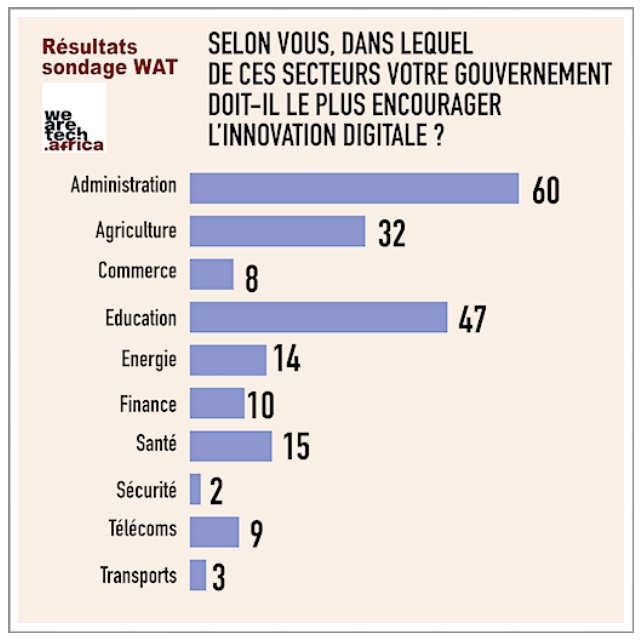
Evolving and diversified uses
When it comes to digital adoption, it's no surprise that social networks are the most widely used, followed by online media and financial services (mobile money and fintech). However, there has been a significant breakthrough in e-commerce, e-admin, e-education, and even artificial intelligence.
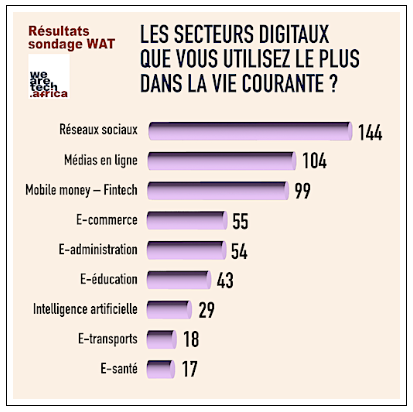
There are still obstacles to digitalization in Africa
According to respondents, the main obstacles to digitalization in Africa are high costs, poor connectivity, and a lack of promotion of new services.
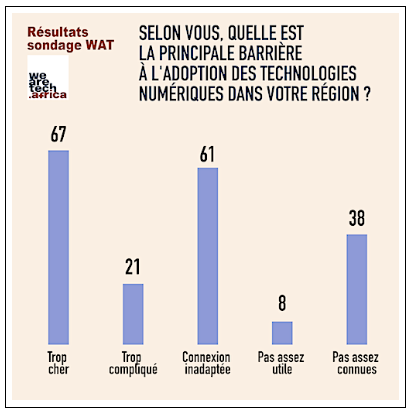
ChatGPT is getting into daily habits
Of the respondents, 39% claim to use the OpenAI service, while 8% even claim to use it daily.
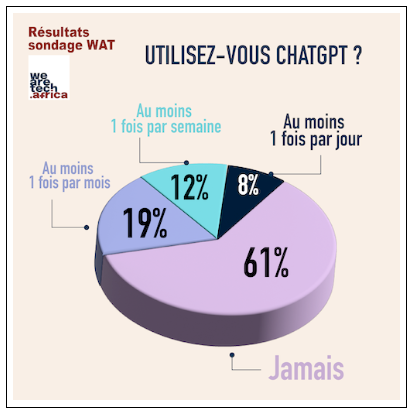
Cryptos remain attractive
While 63% of Internet users believe that cryptocurrencies are of no interest to them, 9% already own a wallet and 25% are considering opening one.
